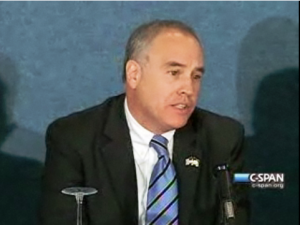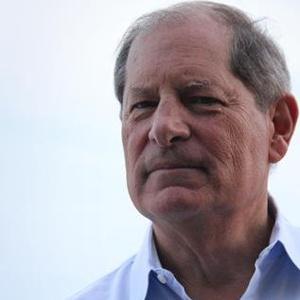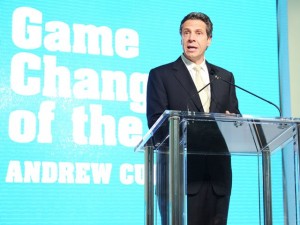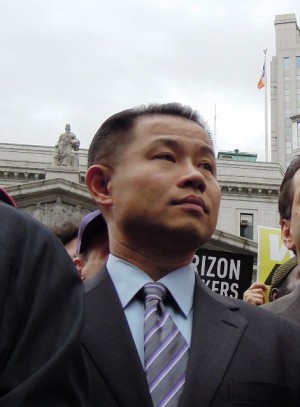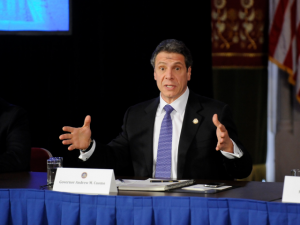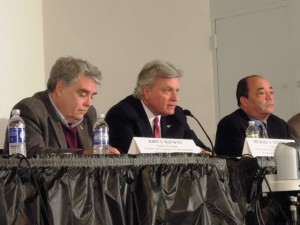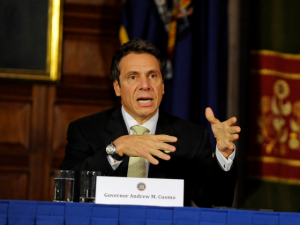Colby Hamilton appears in the following:
DiNapoli: new pension tier offers 'minimal' savings
Thursday, March 01, 2012
In case you missed it: Comptroller Thomas DiNapoli, in a sit-down interview with the Empire on Wednesday, laid on his case against the push for a new pension tier. It was buried in yesterday's piece but is worth taking an isolated look at:
The Comptroller also discussed the pension reform debate. Mayor Michael Bloomberg was in Albany on Wednesday to push state legislators to pass Governor Andrew Cuomo’s proposed Tier VI plan.
“As local elected leaders, we are the ones who see firsthand just how rising pension obligations are taking a bigger and bigger bite how they’re increasing our tax rates all across this state, money that’s coming out of the pockets of people who are working hard trying to make ends meet and have a future for themselves and their families.”
DiNapoli pointed out that the biggest driver of state pension costs right now is the fallout of the financial crisis which began in 2007.
“Any discussion of changing the parameters of a new tier is not going to impact on the cost that are of concern today,” he said. “We did a new Tier V just two years ago...It had minimal impact on the cost. You do a Tier VI, right--you do it today: minimal impact on the cost."
On this point, the Governor and Comptroller don’t appear to be in disagreement. Speaking to reporters on Tuesday, Cuomo said “the benefit” of a new pension tier wouldn’t be felt “for years.”
“All we're doing is now changing the rules going forward,” he said. “You're not going to feel these changes for many, many years.”
DiNapoli echoed the Governor’s point on the new tier: “Until you starting hiring a sign number of people in those two tiers, it's not going to have a significant impact."
The difference? Cuomo sees the system as ultimately flawed, as it leaves tax payers on the hook, and in need of a fundamental overhaul that would semi-privatize the system. DiNapoli sees the system as essentially working, and thinks that, instead of making these fundamental decisions “at an extreme” like we are now, we should approach such a long-term situation with an equally expansive mindset.
“I think it's totally appropriate to debate the different parameters of retirement age and contribution level--that's what Tier V's discussion was all about,” he said. “Let’s have a fact-based, thoughtful, inclusive discussion. I think that's the smarter way to approach this question."
Bloomberg, elected leaders visit Albany to push for pension reform
Wednesday, February 29, 2012
By Karen DeWitt, New York State Public Radio Capital Bureau Chief
New York City Mayor Mike Bloomberg, along with mayors and county leaders from around New York, came to the state Capitol to support Governor Andrew Cuomo’s push for pension reform, saying they are “crashing and burning” under the rising costs.
Bloomberg, who organized the lobbying trip, says the issue is very simple—pension payments are driving municipalities to near bankruptcy.
“We really are up against it,” said Bloomberg. “We are going to have fewer services, we are going to have fewer employees, and in some cases we are going to have higher taxes if this continues.”
The Mayor and other city and county leaders from Rochester, Syracuse, Westchester and Suffolk say they’ve begun a bipartisan lobbying effort to back Governor Andrew Cuomo’s plan to enact a new benefit tier for future public workers. It would have reduced pension payments and for the first time, include an option of a 401(k)-style plan.
The mayors say they planned meetings with several key legislators to hope to convince them to adopt the governor’s plan, though Bloomberg had harsh words for the legislature’s policy on pensions over the years, which he called a “charade.”
“They keep going on and on, having both sides of every single issue,” Bloomberg said.
Bloomberg says when he first took office, annual pension costs were $1.5 billion a year for the City, now they are eight billion dollars annually.
State worker unions have opposed the proposed pension changes, saying future workers would see their retirement benefits reduced by as much as 40 percent, or, if they choose 401(k)s, will be subject to gyrations of the stock market. Governor Cuomo has said in recent days that he is “flexible” on whether the 401(k) option needs to be included in a pension reform agreement with the legislature.
“It’s not a philosophical debate,” Cuomo said Wednesday. “It’s about saving money.”
Cuomo says if the legislature can come up with an alternative plan that saves the $113 billion dollars that the governor estimates can be saved in future decades, then he’s willing to consider it.
Mayor Bloomberg says he’s not going to “complicate” Cuomo’s efforts by insisting on the 401(k) option for the pension reform plan, but he says defined benefit plans have become largely unaffordable.
Senate Republicans have said they are open to Cuomo’s pension reform changes, Assembly Democrats have not yet committed to it, and some Democrats oppose the plan.
DiNapoli on Wall Street's 'new normal' after report shows smaller profits, bonuses
Wednesday, February 29, 2012
New York State Comptroller Thomas DiNapoli released a report today highlighting the shrinking profits of Wall Street. According to the report, upcoming bonuses are projected to decline by 14 percent, as brokerage profits were less than half of what they were in 2010.
In a sit-down interview with WNYC’s Empire blog, the Comptroller said the good news was that the state and city had both planned for decreased revenue from the financial industry in their budgets. But more importantly, DiNapoli said, the shrinking of Wall Street profits could be a good thing.
“As we move towards more implementation of federal regulatory oversight, where the emphasis will be on transparency, accountability in compensation, tying it to long-term profitability, less leverage, higher cash reserves--all of that adjustment, which we're seeing the beginnings of in terms of impact, that's probably going to continue,” he said. “If that produces an industry that is profitable, at a sustained level, we may not have the peaks we had a few years ago ever again but if the tradeoff is that we won't have the kind of valley that we had in ‘08 and ‘09 i think that's good for everyone--certainly from the point of view of planning for city and state budgets; it will make it much easier.”
DiNapoli said he couldn’t say for sure if the trend on Wall Street was “the new normal”, but he did note that just like this month has seen an improvement in the markets—the Dow hit 13,000 for the first time since 2008 this week—last February started the year out strong.
“"That's not how the rest of the year played out,” he said.
From the government spending side, he said both the city and state budgets have already started responding to the possible permanence of a smaller Wall Street.
“I think we've already anticipated this trend,” he said. “We just have to continue to monitor carefully where it's all headed.”
Senate Republicans want to draw Brooklyn Orthodox community in Turner's NY-09
Wednesday, February 29, 2012
Congressman Bob Turner (Courtesy of the Congressman)
According to a Senate source, the GOP congressional maps that will be released today will show why they want to preserve the NY-09 seat of Bob Turner. According to the source, under their plan the seat would move further into Brooklyn, consolidating the Orthodox Jewish community inside Turner’s district.
Earlier reports on the proposed maps say that while both Assembly Democrats and Senate Republicans have agreed to carving up upstate seat of Democratic Representative Maurice Hinchey, who will retire at the end of this term, there is particular disagreement over the Turner seat.
According to reports, Assembly Democrats want to cut up the mostly-Queens 9th district, which Republican won in a special election last September—something that had been anticipated even before Turner’s win.
But with the redrawing of Turner’s seat to include a larger portion of the Orthodox Jewish community in southern Brooklyn, Republicans are pushing for a seat they’re drawing to win.
This is the latest in a series of Republican moves to consolidate the Orthodox community they see as a potentially natural constituency. On the state legislative side, a new senate district is being proposed that would itself consolidate the Orthodox community in southern Brooklyn. A special election being held next month to fill the seat vacated by disgraced former senator Carl Kruger is setting the stage for a battle in the proposed seat that Senate Republicans they believe they can win, even if Democrat Lewis Fidler beats Republican David Storobin on March 20.
A call to the Assembly speaker’s office hasn’t been returned to confirm the difference between the lines in question.
'The Capitol Pressroom' with Susan Arbetter
Wednesday, February 29, 2012
 Today on "The Capitol Pressroom":
Today on "The Capitol Pressroom":
Chuck Malloy, Superintendent of the Unatego School District and Martin Messner, a teacher in the Schoharie Central School District and Teacher Assocation President will join us to highlight the challenges facing rural and smaller-city school districts.
Anschutz Explorations Attorney Tom West discusses the recent Dryden ruling on Home Rule.
Assemblyman Joseph Lentol, Chairman of the Codes Committee has concerns about the so-called "Quick Kill" bill and protecting shelter animals
And Pedro Noguera shares the reasons behind his resignation several weeks ago from the SUNY Board of Trustees.
For show archives, please visit The Capitol Bureau's website here.
Public battle begins over redistricting constitutional amendment
Wednesday, February 29, 2012
The redistricting conversation has been focused lately on the incremental issues of the now: Cuomo’s increasingly pale veto statements, a federal court pushing forward with their own congressional maps, the state legislature failing to meet its own deadline for new maps.
But there’s also a battle of ideas happening over what a constitutional amendment—something Cuomo and others say could be part of a compromise in the current process—giving future redistricting over to an independent process. But are all processes created equal?
The Skinning of a Redistricting Cat
Back in September we looked at what independent redistricting could look like in New York State, based on models in other states and conversations with democracy advocates. Lately there has been an op-ed back-and-forth going on between two different visions of what “an independent process” really means.
Cuomo honored amid pension battle
Tuesday, February 28, 2012
The Governor receiving an award last year. (Huffington Post/AOL / Billy Farrell Agency)
Even as Governor Andrew Cuomo accepts an award tonight for his austerity program in Albany, he’s in the middle of a battle over his proposal to overhaul the state’s multi-billion dollar pension fund. On one side it’s been the Governor and a slew of business-backed groups, local elected officials—including Mayor Michael Bloomberg—and Republican state legislators. On the other, Cuomo has found a foil in Comptroller Thomas DiNapoli, who has been one of the most vocal defenders of keeping the public pension system public, backed by the unions and, to a lesser public degree, Assembly Speaker Sheldon Silver.
The Pierre Hotel—a classy, if a bit musty hotel at the eastern corner of Central Park in Manhattan—will host the Citizens Budget Commission’s 80th Annual Awards dinner tonight. The non-profit think tank will use the opportunity to honor a man who has, over the past year, done more to advance its agenda than anyone else in New York: Governor Andrew Cuomo.
“He has articulated and pressed for many of the key items on the CBC agenda,” said CBC’s president Carol Kellermann. “He is in many ways a spokesperson for fiscal responsibility, and the wise and prudent expenditure of tax-payer funds. He had an on-time budget last year, with no tax increases, and very few ‘one-shots’—all very important items on the CBC agenda.
She went on to note that, this year, he’s included even more of the group’s agenda items in his budget, including pension reform, which has been “something that CBC was—until the stock market crash—virtually alone in advocating for.”
“When it was time to decide who would win our award this year, there really was unanimity among the trustees on the executive committee that he was the logical choice,” Kellerman said.
Cuomo accepts the award amidst what has proven to be arguably the most contentious issue he’s taken on so far with pension reform. Cuomo initially wanted to semi-privatize the pension system by introducing the possibility for new employees to put their retirement savings in 401(k)-type accounts, though, lately, he appears to be softening on the idea.
However, the Governor has keeping the pension fund as-is “could literally bankrupt the State of New York,” and that “[t]here must be pension reform in the budget.” He still supports changing the benefits future employees will receive out of the pension, as well as the amount they contribute.
The Comptroller has responded to the pressure for change in the pension system by pointing to both the benefits of the system—its better-than-most-states level of funding, the safety in pooled capital for its investors, the ability to use the fund’s investments to demand change from companies—as well as the fact the system is still rebounding from the worst recession since the Great Depression, and mostly intact. He’s called using the current fiscal state of things to justify a long-term critical overhaul of the pension system “not the smartest move.”
Comptroller Liu's campaign treasurer arrested--updated
Tuesday, February 28, 2012
With reporting from WNYC's Bob Hennelly
UPDATE: New York City's comptroller says he plans to reassess whether to run for office in 2013 following the arrest of his campaign treasurer in a continuing probe of the Democrat's fundraising efforts.
Comptroller John Liu said, "We are going to sort through this stuff and figure out what the next course of action will be."
Liu, considered a potential candidate to succeed Mayor Michael Bloomberg, faced a throng of reporters Tuesday night, wanting to know if the arrest of a key player in his campaign had derailed his plans for 2013.
'The Capitol Pressroom' with Susan Arbetter
Tuesday, February 28, 2012
 Today on "The Capitol Pressroom":
Today on "The Capitol Pressroom":
How will Magistrate Judge Roanne Mann go about creating the Congressional maps that Albany lawmakers failed to agree on by March 12th? What criteria should inform her decision-making? Will she work from previous maps, or start from scratch? To what extent will incumbency be a factor? Common Cause Executive Director Susan Lerner has some thoughts on the subject.
New York Gaming Association President James Featherstonhaugh on enhanced casino gambling.
Keith Pickett, the Executive Director of the Center for Problem Gambling on enhanced casino gambling and its relationship to problem gambling.
Former Special Counsel to Governor David Paterson, Peter Kiernan shares a look back at some of the political calculations made at the very beginning of the hydrofracking debate in New York State. Kiernan is participating in today’s ‘standing-room only’ Warren Anderson Breakfast conversation on the issue in the Capitol’s Assembly Parlor from 8am – 9am.
And Marina Marcou-O'Malley, Policy Analyst for Alliance for Quality Education and Karen Scharff, Executive Director of Citizen Action of New York, join us with yet another reason why pre-k education should be fully funded.
For show archives, please visit The Capitol Bureau's website here.
Dozens of rabbis come out against Councilman Fidler in senate special election
Monday, February 27, 2012
A group of 49 rabbis urged followers not to vote for Councilman Lew Fidler in the special election to replace disgraced former senator Carl Kruger. In a letter titled "A Message for the Community", the rabbis detail Fidler's support for same-sex marriage, declaring:
It is therefore considered to be a great Chilul Hashem [desecration of God's law] to vote for or provide funding, campaign assistance, public recognition or any type of campaign support to Mr. Fidler. To do so would amount to being mesiy’ayah ovrei aveirah (abetting transgression of the Torah’s commandments).
Fidler's campaign has released a list of 266 endorsers of his campaign, but the Politicker blog found that"at least a handful of these backers, mostly rabbis, are no longer on board with Mr. Fidler as he campaigns in the heavily Jewish, southern Brooklyn district."
The letter from the rabbis did not go so far as to endorse a vote for Fidler's opponent, Republican David Storobin.
The letter is after the jump. [h/t to the Orthodox Pundit.]
Cuomo reworks pitch for new pension tier
Monday, February 27, 2012
By Karen DeWitt, New York State Public Radio Capital Bureau Chief
(Courtesy of the Governor's office.)
Governor Andrew Cuomo took a step back from his proposal to give new state workers the option of defined contribution 401(k) plan Monday, but the governor says without pension reform, local governments in New York could end up “bankrupt”.
Cuomo told a receptive audience of mayors from around the state that New York’s current pension system is unsustainable and must be changed for future hires.
“If we do not do this, we could literally bankrupt the state of New york,” Cuomo said.
The governor, in his budget proposal, wants a new benefit tier that offers a reduced public pension or a 401k style plan, but he says he’s flexible like “Gumby” on that.
“I’m not saying that ‘this is my plan, you know, it’s my way or the highway’,” Cuomo said.
Cuomo says if lawmakers offer an alternative plan that saves as much money as his plan, then he’s open to talks. The governor says his plan will save $113 billion dollars over future decades.
A spokesman for the state’s largest public workers union, the Civil Service Employees Association, says even without the 401(k) option, Cuomo’s proposed Tier VI benefit plan is too meager.
“The Tier 6 plan represents a 40 percent reduction in benefits, with or without options," CSEA’s Steven Madarasz said in a statement. "That is all about corporate CEOs driving an agenda that tells future nurses, school bus drivers, highway workers and others to give up hope of future security."
Federal judges move to draw NY congressional maps
Monday, February 27, 2012
From left, Assemb. Jack McEneny, Sen. Michael Nozzolio and Sen. Martin Malavé Dilan (Colby Hamilton / WNYC)
In Brooklyn federal district court today a three-judge panel took a decisive step towards having new congressional lines drawn by an appointed magistrate judge, and not by the legislatively-controlled LATFOR committee.
Led by Circuit Judge Reena Raggi, who spoke almost exclusively for the triumvirate, the panel cited the "utmost urgency" of having congressional lines in place for the primary petitioning period that begins on March 20. The panel of judges instructed a court-appointed federal magistrate, the Honorable Roanne Mann, to retain experts and get public feedback in order to have a proposed set of new congressional boundaries to the court by Monday, March 12.
A public hearing on the court's proposed lines would be held on March 15.
Legislative leaders have up to now been unable to agree upon and present a set of congressional maps to the public. We may get our first glimpse of what the state Assembly and Senate have in mind soon; maps from the parties in the case are due by the end of this week.
But some observers believe the legislature isn't going to give up its power to draw maps that easy.
"I think the chances are that they [the legislature] will get it together and draw the lines," said Jerry Goldfeder, a New York City-based election lawyer. "This is just an extra motivating force."
The question will be whether or not they've run out of time: even if the legislature is able to agree upon a set of maps, they must then get Governor Andrew Cuomo to sign them into law. And even then, the legislature's maps must then be pre-cleared by the Department of Justice, who has up to 60 days to review them.
Latino groups to Cuomo: Veto the legislative lines
Monday, February 27, 2012
In a letter sent to Governor Andrew Cuomo late last week, LatinoJustice and the National Institute for Latino Policy called on the Governor to veto the legislative redistricting lines that were expected to come out this week.
You will be asked to approve and sign off on proposed redistricting maps in the coming days. We ask that you not adopt these proposed districts wholesale without further scrutiny...[W]e firmly believe that the entire Senate plan and parts of the Assembly plan, have been drawn in an attempt to minimize the Latino Communities' impact and potentially violate the Latino communities' ability to elect candidates of their choice.
LatinoJustice is involved in a law suit that's challenging the legislature's progress in and process for drawing new federal and state legislative lines. It helped lead to the hearing being held in Brooklyn today to determine how much a federal court will get involved in the process.
In the letter below, the groups' presidents say the proposed state legislative maps "go out of their way to draw lines that tend to split up well-settled communities and which dilute the voting power of Latinos in certain districts."
LatinoJ Cuomo Letter
Redistricting round-up: McEneny, Silver say no congressional lines this week
Monday, February 27, 2012
It doesn’t look like new congressional lines will be revealed any time soon.
'The Capitol Pressroom' with Susan Arbetter
Monday, February 27, 2012
 Today on "The Capitol Pressroom":
Today on "The Capitol Pressroom":
Medicaid is one of the primary cost drivers in the state; reforming the system is long overdue. As policy makers explore possible ways to contain costs, they also must balance the needs of the most vulnerable New Yorkers who depend on services that Medicaid provides. Today on the Capitol Pressroom we discuss the impact that certain state policies have had on two of these groups: people with mental illness and people with developmental disabilities.
Mental Illness
When state psychiatric facilities close, where do the residents go? According to the Mental Illness Policy Organization, too many go to prison. Patricia Baker, Vice President the New York State Public Employees Federation joins us along with DJ Jaffe, the founder of Mental Illness Policy Org to discuss what their respective organizations both consider trends of concern regarding the state's policy of transitioning people with mental illness from state institutions into community-based care.
Developmental Disabilities
Similarly, the state is hoping to close some larger institutions where people with developmental disabilities live. This comes in response to both the cost of care, as well as widely publicized systemic abuses within the system. Albany Law School's Bridgit Burke and Rhonda Frederick of the nonprofit provider Developmental Disabilities Alliance of Western New York will share concerns about the changes being implemented.
“Home” Rulings
Ithaca attorney Helen Slottje, of the Community Environmental Defense Council joins us along with Katherine Nadeau of Environmental Advocates with a pro-home rule perspective on the court decisions in both the Dryden & Middlefield cases.
For show archives, please visit The Capitol Bureau's website here.
De Blasio supports the creation of a new Latino congressional seat
Friday, February 24, 2012
In a statement released today, Public Advocate Bill de Blasio threw his support behind the creation of a new Latino-majority congressional district during this year's redistricting process:
New York City rises on the foundation of our rich diversity. The remarkable achievements of Latino New Yorkers are increasingly defining our city's civic life, economy and faith communities. Our charge, as progressives, is to ensure that the opportunity for a political voice keeps pace.
Our State Legislature has the historic opportunity to create a third Congressional District to affirm the right of the growing Latino community to elect the candidates of its choice, without significant changes to current ‘majority-minority’ Congressional districts. With attacks on Latino electoral participation growing across the nation, creating a third Latino congressional district here would reaffirm our city's commitment to the American principles of openness, diversity and civic participation.
Creation of this new congressional district is the most appropriate means of ensuring that Latino voting interests are adequately represented in New York's congressional delegation.
Former AG Abrams: Gov, use your veto for a 'permanent solution' to partisan redistricting
Friday, February 24, 2012
Calling the process poisons for democracy, former Attorney General Bob Abrams told reporters on a conference call that Governor Andrew Cuomo was in "a unique moment in the state's history" when it comes to the decennial process of redrawing legislative district lines.
"Governor Cuomo in the campaign as candidate for governor made a pledge about vetoing lines that would be drawn in a partisan way," Abrams said. "We have for the first time some lever of power of the legislature."
The call was organized by Citizens Union, which Abrams is connected to as president of the organizations advocacy arm. He, like the organization, called on the Governor to use his veto to negotiate a compromise that sees the state's redistricting process taken out of the hands of the legislators ten years from now.
"We should use this unique moment in history—where a candidate for governor made a pledge … is prepared to stick by his pledge, but at the same time not just have that pledge effectuated by virtue of having a Pyrrhic victory--by winning a battle, but not really winning the wary," Abrams said.
The conference call was the latest in a recent push by Citizens Union to have Cuomo use his veto threat as a way to get, as Abrams put it, "permanent solution to this problem [of having the legislature draw their own lines] and have an amendment to the constitution presented to the people of New York State."
Yesterday Citizen Union's Dick Dadey sent a letter to the Governor, calling on him to "secure lasting and permanent redistricting reform through statutory change and a constitutional amendment; and pursue meaningful changes to this year’s lines by holding direct negotiations with the legislature."
Attorney General Abrams outlined a series of bullets of his own in a press release before the call. Most notably he suggested the future independent process look similar to the one currently used in Iowa. Back in September of last year, we broke down the various ways independent redistricting works (or doesn't), and highlighted the Iowa system:
Only a few states have actual independent commissions: Arizona, Hawaii, Idaho, New Jersey, Washington and California. These commissions have specific rules for who can be on the commission, and guidelines for how district lines should be drawn. In most states, the legislature has a direct role in picking the members of the commission.
For example, in Idaho the majority and minority parties in each chamber pick a commissioner, as does the head of each statewide party. None of the commissioners are allowed to be current office holders.
The commission has 90 days to come up with a plan, during which the public is allowed to comment and provide their own plans. The commission then picks a plan and votes on it. Neither the legislature nor the governor has a say in the process.
Not all good government groups are jumping on the compromise band wagon. Common Cause's Susan Lerner released a statement again calling on Cuomo to veto the lines:
"New Yorkers deserve real permanent reform of the redistricting process, and we welcome the opportunity for an open discussion of what a constitutional amendment should look like," Lerner said in the statement. "However, reform in the future is not interchangeable with the best possible result in this cycle which, due to the Legislature's intransigence, lies entirely with the courts. The Governor got it right when he promised to veto any gerrymandered lines."
She continued: "The Governor has repeatedly called for a better process this year and a better product in the future: he can have both. Vetoing the lines and letting the courts handle the process is the best possible outcome for this redistricting cycle."
Local lawmakers' coalition hammers DiNapoli over pension reform
Friday, February 24, 2012
Local lawmakers think that Comptroller Thomas DiNapoli is the one misinformed about pension reform.
A bipartisan coalition of local lawmakers that includes New York City Mayor Michael Bloomberg are continuing to push for Governor Andrew Cuomo's proposed pension reform. And they're taking direct aim at the person seen as the biggest defender of the current pension fund system: Comptroller Thomas DiNapoli.
In a recent op-ed, you defended the status quo and criticized those who say that pensions are “unsustainable and unaffordable.” But we know first-hand that the facts on the ground run counter to your comments. Pension costs for New York’s localities and counties have grown by more than 630% over the last decade. These skyrocketing costs have meant less money for our schools, less money for our police departments, less money for job creation, and less money for social services. If pension costs are allowed to continue to grow – as they will in the absence meaningful reform now – the level of service cuts and tax increases that will be required to balance our local budgets in the future will be devastating. That outcome is unacceptable and entirely avoidable.
The letter is signed by the mayors of New York City, Syracuse and Jamestown, as well as the county executives of Westchester, Suffolk, Monroe, Onondaga and Oneida. In it, they argue the Governor's plan will save localities--including New York City--$79 billion over the next 30 years.
"To dismiss the importance of $79 billion in savings because it will be realized over time is simply not responsible," the letter says. "In the weeks ahead, there will undoubtedly be efforts by special interests to distort the facts and stop responsible and fair reform of our pension systems. We hope you will reject those efforts and instead be guided by the fiscal realities that local governments are facing."
Minority legislative caucus: NY has a revenue problem, not a spending problem
Thursday, February 23, 2012
The calls for austerity and sacrifice have been woven into politicians' speeches on budgets for the past five years. The Black, Puerto Rican, Hispanic & Asian Legislative Caucus, in its "People's Budget" released today, pushes back on some of the arguments--and actions--made by those in favor of a cutting-and-gutting, budget-crisis approach.
The Caucuses' analysis notes that "New York’s move to austerity budgeting in its 2010-11 budget
and even more so in 2011-12 budget appears to be having a negative impact on New York’s
relative performance in terms of private sector employment."
They point to the state slipping from 4th overall in national job growth to 25th in the last year.
Additionally, the analysis argues that the state doesn't have a spending problem as much as a revenue problem. Over the past 20 years, the report says, the state has given large tax cuts, while at the same time taken on "important new spending commitments" in the form of property tax exemptions, Medicaid programs and cost growth, and new court-ordered school spending.
"By adding these important new commitments to the state budget without adding revenue to pay for them, the state was on course to face large projected budget gaps unless the revenue produced by the existing tax system were to grow fast enough to cover both the ordinary growth in the cost of existing programs and the cost of these new commitments," the report says. "Not only did revenues not grow fast enough to accomplish that feat but the meltdown of the finance sector and the subsequent Great Recession resulted in actual year to year reductions in state revenues."
While the budget analysis doesn't go so far as to suggest a different approach to closing the current budget gap of $1.1 billion, it does focus in on education as the area of greatest concern. In particular, the Campaign for Fiscal Equity, which won a court case against the state for underfunding minority school districts in 2006, has been hurt by recent budget cuts, the report found.
"[I]n 2012 there is an opportunity for restoring some of these classroom cuts. The Executive Budget will restore $805 million in school aid; however, this amount of money does not begin to put our schools back on track to restore the quality programs that our students lost in the past two years," it says, calling for the Governor to fund the state's obligation before any general funding formula gets enacted.
The People's Budget
ICYMI -- Court: Town of Dryden can ban fracking
Thursday, February 23, 2012
By the Innovation Trail's Matt Richmond
In his decision, Supreme Court Justice Phillip R. Rumsey says New York's oil and gas law gives the state the authority to decide how, but not where, drilling can be done.
Under this construction, local governments may exercise their powers to regulate land use to determine where within their borders gas drilling may or may not take place, while DEC regulates all technical operational matters on a consistent statewide basis in locations where operations are permitted by local law.
The decision will come as a relief to the dozens of other towns in New York that have banned or placed moratoriums on drilling.
Dryden's ban was enacted in August as an amendment to a zoning law already prohibiting heavy industry. In September, the Denver-based oil and gas company Anschutz Exploration filed a lawsuit challenging that ban.
Dryden's lawyer, Mahlon Perkins, says the state will still regulate the technical aspects of drilling.
"And it was left to municipalities under their zoning authority and land use authority to regulate the "where" and even the 'if.'"
Anschutz is considering whether or not to appeal the decision based on business factors, says the company's lawyer Tom West.
"That'll be based on cost and whether or not they're going to remain involved in New York State," says West.
He says the outcome of a landowner challenge of the Town of Middlefield's ban on drilling will also determine the next step.
"Ultimately, this issue may have to go back to the legislature but I think it's premature at this point," West predicts. "We need to get a ruling from the courts and we need to get an appellate ruling clarifying what is and what is not allowed."
West notes that the Dryden decision runs counter to that of Pennsylvania.
"Pennsylvania kept the authority of municipalities to regulate some aspects of natural gas activities but required the municipalities to declare that drilling is a permitted use in every zone. So they've essentially taken the opposite position saying municipalities cannot ban natural gas drilling."

